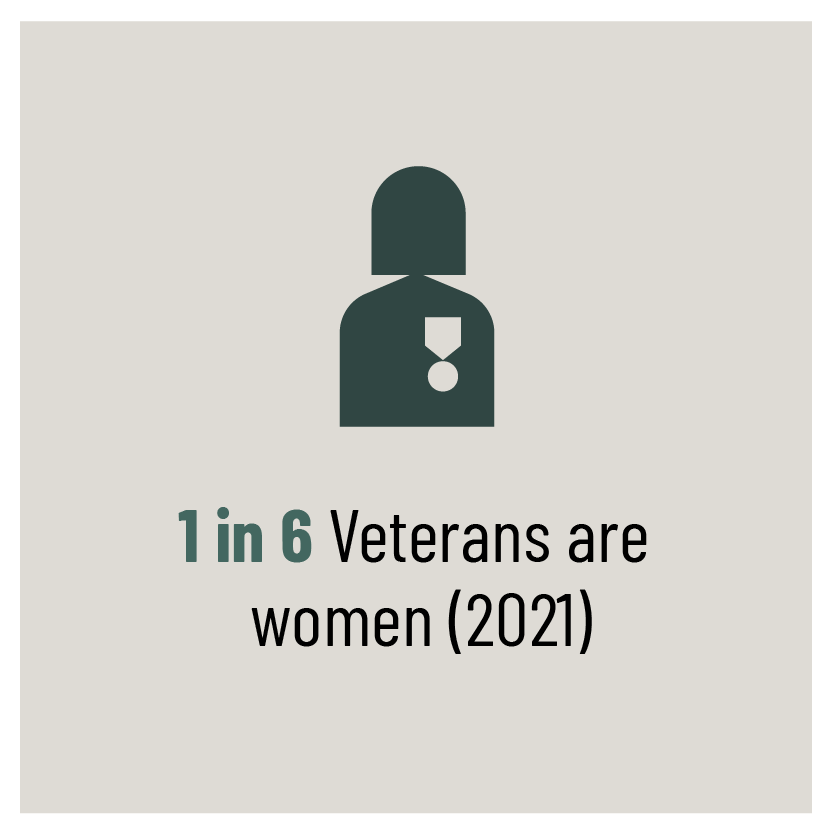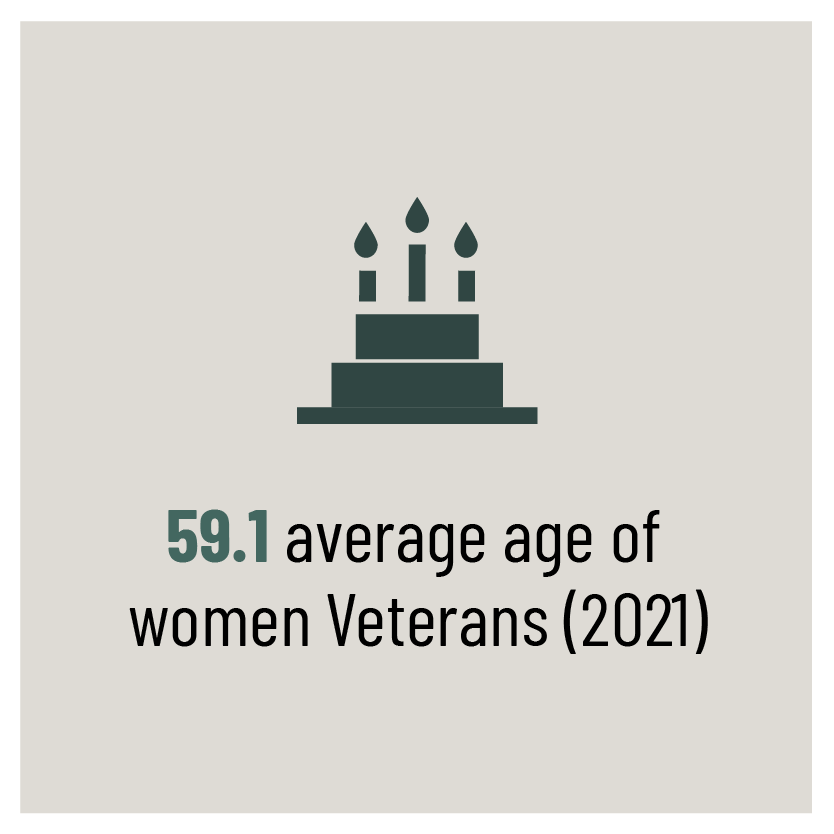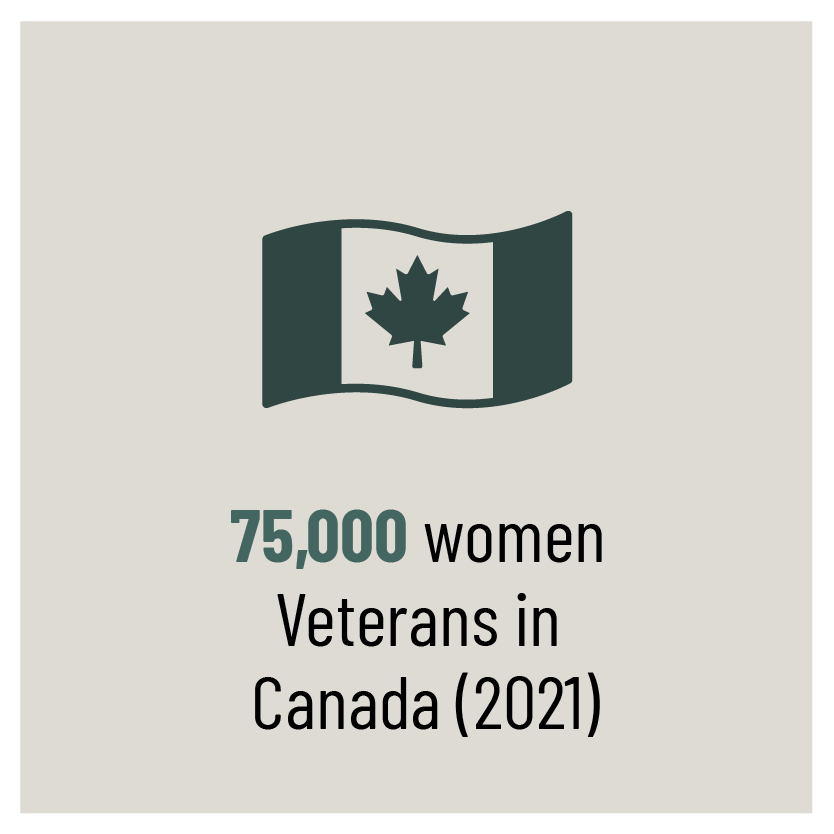Women Veterans’ health
Background
Women have been serving in the Royal Canadian Mounted Police (RCMP) and the Canadian Armed Forces (CAF) in various capacities dating back to the late 19th century. In the mid-1970s, the RCMP began accepting applications from women for regular police duties. Around this same time, the CAF began conducting trials (SWINTER, CREW) to determine if women could perform in military roles and by the late 1980s, women were able to join the CAF in nearly all military occupations. As of 2022, women make up 16.3% of the CAF and 21.8% of the RCMP.
Military and paramilitary occupations are demanding and they come with inherent risks to physical and psychological safety. Over the years, many women have also endured harassment, discrimination, and physical and sexual assault (Deschamps, 2016). The military system was initially designed for men, which resulted in women having to wear ill-fitting equipment and protective gear, and facing challenges with pregnancy and motherhood while in service (Waruszynski et al., 2018; Waruszynski et al., 2021).
Because of this, many women experienced challenging careers and those experiences have impacted their life after service (Eichler, 2022). Researchers are only just starting to understand these impacts.



Current research
As it currently stands, there is limited research about the health and well-being of women Veterans in Canada. This is, in part, because fewer women than men have been serving members and Veterans. While some experiences will be similar regardless of sex or gender, there are some factors that are important for or impact only women. Learning more about the health and well-being of women Veterans in Canada is critical for the development, implementation and maintenance of appropriate mental health supports.
The Canadian research tells us that women Veterans in Canada are more likely to have:
- experienced harassment, discrimination and sexual misconduct while in service (Poole, 2021)
- been medically released from the CAF (Serre, 2018)
- experienced a difficult transition to post-service life (Hachey et al., 2016)
- mental health conditions, including mood disorders and anxiety disorders compared to male Veterans (Hall et al., 2020)
- twice the risk of dying by suicide compared to women in the general population (Simkus et al., 2019)
Research from allied nations can give us important insights into the experiences of women Veterans. We know from research conducted in the U.S. that:
- The experience of military sexual trauma (MST) in service is associated with posttraumatic stress disorder (PTSD) and other mental health conditions after service (Sumner et al., 2021).
- Mental health conditions can negatively affect reproductive health (Shaw et al., 2014), sexual health (Pulverman & Creech, 2019), and physical health (Creech et al., 2021).
- Women Veterans have reported difficulties with disordered eating (Arditte et al., 2018), suicidal ideation (Department of Veteran Affairs, 2021) and engaging in problematic alcohol use (Hoggatt et al., 2015).
- There is an increased risk for intimate partner violence for women Veterans compared to civilian women (Dichter et al., 2011)
Learn more about military sexual trauma.
Learn more about intimate partner violence.
Taking action
It is evident that we need to know more in order to support the mental health and well-being of women Veterans in Canada. The Atlas Institute is committed to supporting women Veterans by expanding knowledge and sharing information. By doing this, we can better inform the development of programs and policies that will support the needs of women Veterans in Canada.
The Applied Research team is leading the Atlas Institute’s new research program on women Veterans’ mental health – the Athena Project.
Hearing from women Veterans
In order to better understand the experiences of women Veterans in Canada and to hear what is important to them when it comes to their experiences and their health, the Atlas Institute hosted a series of meetings in Fall 2022. The purpose of these meetings was to inform the development of a research project.
What we heard, and continue to hear, from women Veterans will shape ongoing research projects and initiatives at the Atlas Institute.
Our program of research
Women Veterans’ health is shaped by a complex set of intersecting factors, including experiences in and after service, age, Family and caregiving roles, social and economic circumstances, health care access and sex-specific health factors, among others. Understanding women Veterans’ health and addressing their health needs requires dedicated and responsive research that extends beyond a single study or issue.
Women Veterans’ insights, expertise and perspectives are integral to this research program. Through the Athena Project, a working group of 10 women Veterans of the CAF and RCMP with diverse experiences is actively involved in the design and execution of research projects, contributing their knowledge, skills, insights and expertise to set priorities, design research questions, interpret and present findings and shape ideas for action.
Our research program on women Veterans’ well-being includes studies led by the Applied Research team and related projects developed in collaboration with external partners in Canada and internationally. Together, this body of work focuses on women’s unmet needs, transition to post-service life, moral injury, disability and mental health, and reproductive health. Our goal is to generate evidence that is credible and actionable toward relevant impact for policy, programs and practice.
LOOKING AHEAD: The Atlas Institute, in collaboration with the Canadian Legacy Project, will be releasing a report summarizing the findings from an Athena Project study on women Veterans’ mental health and well-being during transition from the Canadian military.
Resources
- For more information on the history of women in the Canadian Armed Forces:
- For more information on the history of women in the RCMP:
Arditte Hall, K. A., Bartlett, B. A., Iverson, K. M., & Mitchell, K. S. (2018). Eating disorder symptoms in female veterans: The role of childhood, adult, and military trauma exposure. Psychological Trauma: Theory, Research, Practice, and Policy, 10(3), 345.
Creech, S. K., Pulverman, C. S., Crawford, J. N., Holliday, R., Monteith, L. L., Lehavot, K., Olson-Madden, J., & Kelly, U. A. (2021). Clinical complexity in women veterans: A systematic review of the recent evidence on mental health and physical health comorbidities. Behavioral Medicine, 47, 69–87. https://doi.org/10.1080/08964289.2019.1644283
Department of Veterans Affairs. (2021). National veteran suicide prevention annual report. National Office of Mental Health and Suicide Prevention. Washington, DC. Available from: https://www.mentalhealth.va.gov/docs/data-sheets/2021/2021-National-Veteran-Suicide-Prevention-Annual-Report-FINAL-9-8-21.pdf
Deschamps M. (2015). External review into sexual misconduct and sexual harassment in the Canadian Armed Forces. Ottawa: ON. Department of National Defence. Available from: https://www.canada.ca/en/department-national-defence/corporate/reports-publications/sexual-misbehaviour/external-review-2015.html
Dichter, M. E., Cerulli, C., & Bossarte, R. M. (2011). Intimate partner violence victimization among women veterans and associated heart health risks. Women’s Health Issues, 21, 190-194.
Eichler, M. (2022). Making military and veteran women (in)visible: The continuity of gendered experiences in military-to-civilian transition. Journal of Military, Veteran and Family Health, 8, 36–45. https://doi.org/10.3138/jmvfh-2021-0077
Hachey, K. K., Sudom, K., Sweet, J., Thompson, J., Mac Lean, M., & Van Til, L. (2016). Differences in adjustment to civilian life between male and female Canadian Armed Forces Veterans. Res Militaris, 2, 1-12.
Hall, A. L., Sweet, J., Tweel, M., & MacLean, M. B. (2022). Comparing negative health indicators in male and female veterans with the Canadian general population. BMJ Military Health, 168(1), 82–87.
Hoggatt, K. J., Williams, E. C., Der-Martirosian, C., Yano, E. M., & Washington, D. L. (2015). National prevalence and correlates of alcohol misuse in women veterans. Journal of substance Abuse Treatment, 52, 10-16.
Poole, M. N. (2021). Women Veterans of the Canadian Armed Forces and Royal Canadian Mounted Police: A scoping review. Journal of Military, Veteran, and Family Health, 7, 6-18. https://doi.org/10.3138/jmvfh-2021-0020
Pulverman, C. S., & Creech, S. K. (2021). The impact of sexual trauma on the sexual health of women veterans: A comprehensive review. Trauma, Violence, & Abuse, 22(4), 656-671.
Serré, L., & Straver, M. (2018). Attrition patterns of women in the Canadian Armed Forces. Res Militaris, 8, 1-16.
Shaw, J. G., Asch, S. M., Kimerling, R., Frayne, S. M., Shaw, K. A., & Phibbs, C. S. (2014). Posttraumatic stress disorder and risk of spontaneous preterm birth. Obstetrics and Gynecology, 124, 1111–1119. https://doi.org/10.1097/AOG.0000000000000542
Serre, L. (2019). A comparative analysis of medically released men and women from the Canadian Armed Forces. Journal of Military, Veteran and Family Health, 5, 115-124.
Simkus, K., Hall, A., Heber, A., & VanTil, L. (2020). 2019 Veteran suicide mortality study. Veterans Affairs Canada. Charlottetown, PE. Available from: https://www.veterans.gc.ca/eng/about-vac/research/research-directorate/publications/reports/veteran-suicide-mortality-study-2019#female-mortality-over-time
Sumner, J. A., Lynch, K. E., Viernes, B., Beckham, J. C., Coronado, G., Dennis, P. A., Tseng, C. H., & Ebrahimi, R. (2021). Military Sexual Trauma and Adverse Mental and Physical Health and Clinical Comorbidity in Women Veterans. Women’s Health Issue, 31, 586–595. https://doi.org/10.1016/j.whi.2021.07.004
Waruszynski, B.T. & MacEachern, K.H. (2021). Women in the Profession of Arms: Female Reserve members’ perceptions on the attraction, recruitment, employment, and retention of women in the Canadian Armed Forces (Director General Military Research and Analysis Scientific Report). Ottawa, ON: Defence Research and Development Canada.
Waruszynski, B. T., MacEachern, K. H., & Ouellet, E. (2018). Women in the profession of arms: Female regular force members’ perceptions on the attraction, recruitment, employment, and retention of women in the Canadian Armed Forces (Director General Military Personnel Research and Analysis Scientific Report DRDC-RDDC-2018-R182). Ottawa, ON: Defence Research and Development Canada.
FIND MORE RESOURCES
Browse the Knowledge Hub for more evidence-based information, fact sheets, reports and tips.